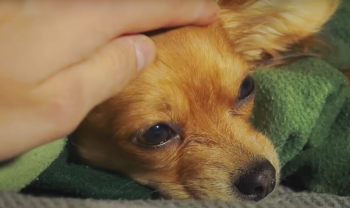Benji, a four-year-old dog, had experienced the confusion and sadness of being adopted and returned to the shelter seven times, each time without much explanation. The shelter staff were perplexed, as Benji was known to be friendly and affectionate—traits that typically make for a desirable pet. Wondering if there might be an underlying issue not evident in the shelter environment, Clara, a young student working at the shelter, decided to take a proactive step.
She took Benji home with her, intending to observe his behavior in a home setting to uncover any issues that might be leading to his repeated returns. This initiative aimed to better understand Benji’s needs and potentially find a solution to help him find a stable, loving home.

Clara’s decision to take Benji home revealed a crucial aspect of his behavior that had been previously overlooked. Initially, Benji displayed his usual cheerful demeanor in Clara’s home. However, the atmosphere shifted dramatically when Clara introduced Benji to her other pets. To her surprise, Benji became aggressive and violent towards both her dog and cat. This unexpected reaction prompted Clara to investigate further.
Upon delving into Benji’s history, Clara discovered that all of his previous returns to the shelter had a common factor: each of his former owners also had other pets. It appeared that these owners, perhaps hoping for a better outcome or reluctant to blame Benji, had not fully disclosed the reasons for his returns, attributing them to vague issues instead of his aggression towards other animals.
Understanding the specific challenge Benji faced with other pets allowed Clara and the shelter staff to refine their approach to finding him a new home. They now knew that Benji would thrive best as an only pet, where he wouldn’t feel the need to compete or react aggressively. This insight was vital in ensuring that Benji’s next adoption would be a permanent and happy one, tailored to his specific needs.

Clara’s commitment to Benji went beyond simple observation; she dedicated herself to addressing his behavioral issues. Through consistent training focused on reducing his hostility towards other animals, Benji gradually began to adapt to the presence of Clara’s other pets. This progress was a significant turnaround from his initial aggressive reactions.
Over time, with patience and persistent training, Benji learned to coexist peacefully with Clara’s dog and cat. Witnessing his transformation and potential for change, Clara made the heartwarming decision to give Benji a permanent place in her home. By adopting him, she not only provided Benji with a stable and loving environment but also continued to work on his socialization skills.
Benji’s story underscores an important message: dogs with behavioral issues can indeed become wonderful companions if given the right training, attention, and love. Clara’s dedication to Benji exemplifies how persistence and understanding can help overcome challenges, leading to successful rehabilitation and a happy life for rescue animals.
 Toledo, United States.
Toledo, United States.